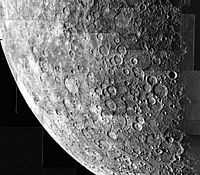Radiation astronomy/Quiz
< Radiation astronomy
Radiation astronomy is the key introductory lecture and article of the course on the principles of radiation astronomy.
This is a quiz based on the lecture that you are free to take at any time or knowledge level.
Once you’ve read and studied the lecture itself, the links contained within it and listed under See also, you should have adequate background to take the quiz and score highly.
As a "learning by doing" resource, this quiz helps you to assess your knowledge and understanding of the information, and it is a quiz you may take over and over as a learning resource to improve your knowledge, understanding, test-taking skills, and your score.
This quiz may need up to an hour to take and is equivalent to an hourly.
Enjoy learning by doing!
Quiz
Research
Hypothesis:
- Quiz questions about radiation astronomy may be made too difficult.
- Quiz questions could start out easy association and work up to more difficult.
- In 2015 two quizzes made the top 1000: Planets/Quiz and Classical planets/Quiz.
- Intergalactic medium was averaging 6 hits per day, but after the move to the subpage its down to 1 per day.
Control groups

The findings demonstrate a statistically systematic change from the status quo or the control group.
“In the design of experiments, treatments [or special properties or characteristics] are applied to [or observed in] experimental units in the treatment group(s).[1] In comparative experiments, members of the complementary group, the control group, receive either no treatment or a standard treatment.[2]"[3]
Proof of concept
Def. a “short and/or incomplete realization of a certain method or idea to demonstrate its feasibility"[4] is called a proof of concept.
Def. evidence that demonstrates that a concept is possible is called proof of concept.
The proof-of-concept structure consists of
- background,
- procedures,
- findings, and
- interpretation.[5]
See also
References
- ↑ Klaus Hinkelmann, Oscar Kempthorne (2008). Design and Analysis of Experiments, Volume I: Introduction to Experimental Design (2nd ed.). Wiley. ISBN 978-0-471-72756-9. http://books.google.com/?id=T3wWj2kVYZgC&printsec=frontcover.
- ↑ R. A. Bailey (2008). Design of comparative experiments. Cambridge University Press. ISBN 978-0-521-68357-9. http://www.cambridge.org/uk/catalogue/catalogue.asp?isbn=9780521683579.
- ↑ "Treatment and control groups, In: Wikipedia". San Francisco, California: Wikimedia Foundation, Inc. May 18, 2012. Retrieved 2012-05-31.
- ↑ "proof of concept, In: Wiktionary". San Francisco, California: Wikimedia Foundation, Inc. November 10, 2012. Retrieved 2013-01-13.
- ↑ Ginger Lehrman and Ian B Hogue, Sarah Palmer, Cheryl Jennings, Celsa A Spina, Ann Wiegand, Alan L Landay, Robert W Coombs, Douglas D Richman, John W Mellors, John M Coffin, Ronald J Bosch, David M Margolis (August 13, 2005). "Depletion of latent HIV-1 infection in vivo: a proof-of-concept study". Lancet 366 (9485): 549-55. doi:10.1016/S0140-6736(05)67098-5. http://www.ncbi.nlm.nih.gov/pmc/articles/PMC1894952/. Retrieved 2012-05-09.
External links
- NASA/IPAC Extragalactic Database - NED
- The SAO/NASA Astrophysics Data System
- SIMBAD Astronomical Database
| ||||||||||||||||||||||||||||||||
| |||||||||||||||||||||||||||||||||||||||||
| |||||||||||||||||||||||||||||
| |
Development status: this resource is experimental in nature. |
| |
Educational level: this is a research resource. |
| |
Resource type: this resource is a quiz. |
| |
Subject classification: this is an astronomy resource. |